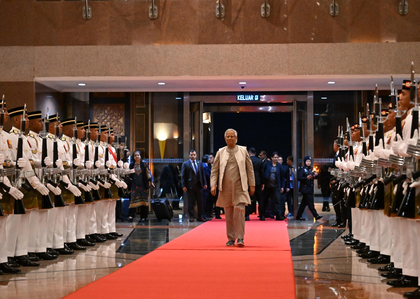Uncertainty grips Bangladesh amid political accusations over Feb elections: Report
By IANS | Updated: November 21, 2025 19:45 IST2025-11-21T19:40:43+5:302025-11-21T19:45:26+5:30
Dhaka, Nov 21 Bangladesh is facing growing uncertainty over February 2026 parliamentary elections, with major political parties accusing ...

Uncertainty grips Bangladesh amid political accusations over Feb elections: Report
Dhaka, Nov 21 Bangladesh is facing growing uncertainty over February 2026 parliamentary elections, with major political parties accusing each other of attempting to delay polls, a report said on Friday.
It added that the Muhammad Yunus-led interim government’s decision to hold the general election and the July Charter Referendum on the same day in February 2026 -- citing logistical efficiency and cost-- has intensified the opposition's concerns that the administration is quietly favouring the Bangladesh Nationalist Party (BNP).
"Jamaat-e-Islami (JI) Bangladesh and its allied parties have stated, time and again, that there will be no election unless a referendum is held first and the charter is made binding on all. JI argues that the July Charter, with its radical political reforms (such as the bicameral parliament and term limits) is a revolutionary document and must be given constitutional and legal validity first through a referendum. However, JI’s concerns plausibly lie in its efforts to legally lock in the reforms and constrain the next parliament's power, ensuring that the next government is elected to serve under the new constitutional framework,” a report in 'International Centre for Peace Studies' detailed.
According to the report, heightened security and the threat of renewed violence now appear inevitable in Bangladesh, as the Awami League (AL) seeks to reassert its political relevance from the sidelines and hinder the electoral process.
“Sajeeb Ahmed Wazed Joy, Sheikh Hasina’s son and advisor, has warned that the party’s supporters are ready to block the upcoming February polls unless the ban on the AL is lifted, a statement that clearly signals the potential for unrest if their demands are not met," it noted.
Meanwhile, on November 17, the Dhaka-based International Crimes Tribunal (ICT) announced its verdict, sentencing Bangladesh's former Prime Minister Sheikh Hasina and former Home Minister Asaduzzaman Khan Kamal to death. The ruling was delivered after an extended trial amid protests by Awami League supporters.
Established in 2009 by the former Awami League government led by Hasina, the ICT was tasked with prosecuting the collaborators accused of committing war crimes and genocide during the Bangladesh 1971 Liberation War.
"After the government was toppled, the interim administration led by Muhammad Yunus restructured the ICT to investigate and prosecute the atrocities committed during the July 2024 Uprising. The very judicial mechanism created by one regime to consolidate its legitimacy by prosecuting its rivals is now being deployed by the successor regime to delegitimise and eliminate the predecessor," the report noted.
Disclaimer: This post has been auto-published from an agency feed without any modifications to the text and has not been reviewed by an editor
Open in app